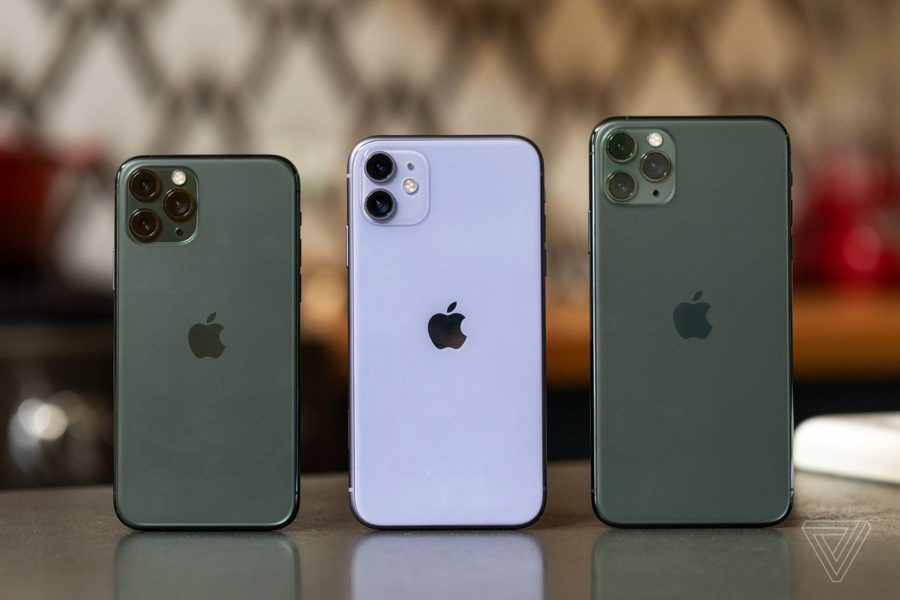iPhone 11: Boom or Bust?
November 23, 2019
After months of rumors, speculation, and leaks, Apple revealed its iPhone 11 lineup in its Keynote event in Cupertino, California. Released on September 20, the device received mixed reviews from critics, some praising the phone for its speed and extra cameras, while others ridiculing the device for its incremental nature and extra cameras. So, the question remains, does the new phone warrant its hefty $700 price tag?
As the newest phone in Apple’s popular iPhone lineup, the iPhone 11, 11 Pro, and 11 Pro Max promise to deliver a better display and improved facial recognition. However, Apple’s major selling point for the iPhone 11 lineup is the upgraded camera setup on each phone. With the iPhone 11 and iPhone 11 Max sporting two and three cameras respectively, Apple promises greater HDR, depth-of-field, and color accuracy. In real world use, many reviews have described that the cameras have significantly improved from last year. As internet-famous YouTuber Marques Brownlee said in his video, iPhone 11 Pro Review: For the Love of Cameras!, “The iPhone 11’s cameras are a big improvement over the 10S. In broad daylight, I’d go as far as saying this has been an A plus camera, often taking the best, sharpest, and cleanest photos I’ve seen a smartphone take. Colors are great, are realistic… dynamic range is excellent… which helps it of course in tougher shooting scenarios where it’s improved a lot over the 10S.” The array of cameras allow for the iPhone to take higher quality photos as compared to the iPhone 10, 10R, and 10S.
In addition, with the phone’s new A13 bionic processor and 4GB of RAM, the phone has, by many accounts, outperformed previous generation phones. Although these specs RAM don’t sound like a lot compared to its Android competitors (mainly the Google Pixel 4 and Samsung Galaxy S10), the A13’s two high performance, AI driven Lightning cores paired with four graphics cores built in promise to deliver greater performance. In performance and benchmarks, the iPhone 11, 11 Pro, and 11 Pro Max all perform between 20 and 30 percent better compared to the XR, XS, and XS Max respectively, and have seen a 15 and 20 percent increase in efficiency as well. Many cite this performance upgrade as another reason to upgrade.
However, some question whether the phone is a significant enough upgrade to justify spending another $700 on a brand new phone. Although the phone has seen improvements to its camera and processing power, most reviewers say that the device remains as lackluster and uninnovative as the XS or even the X. The device has kept the same design as the iPhone 10, bar the new camera “hump,” which has undergone a squareification if you will. The screen also hasn’t seen improvement over the past year, as the iPhone 11, 11 Pro, and 11 Max all have almost identical displays to last year’s counterparts.
Of the many cons of the iPhone 11, a major flaw is its screen. Similar to last year’s iPhone XR, it has a 750p “Liquid Retina” display. Although the display itself is not a bad product (with decent colors and contrast) it fails in comparison to other phones in this price range. For example, the Samsung Galaxy S10e, a similarly priced phone, sports a 1080p resolution with a pixel density of 468 pixels per inch. In comparison to the iPhone 11’s 750p 326ppi, the competition’s display has much better colors and sharpness.
In addition, new updates to older iPhones are making old phones faster, with some users experiencing their phone being faster than on their launch dates. This increase in speed often negates much of the reason to upgrade to the latest flagship phone from Apple. Updates before iOS 10 often slowed the phone down in order to preserve battery life and prevent overheating, as stated by Apple. Although there may have been some truth in this statement, public reaction to this reasoning was negative. Many people assumed that Apple deliberately slowed down phones in order to get customers to purchase a phone that was still relatively new. Due to this backlash, Apple has stopped slowing down phones and instead has now started to optimize newer versions of iOS to their predecessors. For example, iOS 12 brought lightning fast updates to phones all the way back to the iPhone 6, whipping them back up to daily-driver status. These newer updates often dissuade people from buying a new phone.
Furthermore, Apple has addressed the issue of battery life decline, a common reason for upgrading to a new phone. As per their current policy, Apple allows iPhones under warranty and AppleCare+ to reinstall a new battery for free. However, if your phone has left its warranty period, you can still change the battery for a reasonable $49. Many users who have had their batteries replaced report that their phone can last for days rather than hours. Now, given the rising capabilities of older iPhones, the improvement of battery life, and the near static display, does it make sense to upgrade the latest iPhone?The decision to upgrade to a new iPhone largely depends on the type of user. If you currently have a phone older than the iPhone 8, the decision to upgrade makes sense. The refreshed design language of the X and 11 series iPhones would compel many to upgrade. In addition, if you need better camera quality every year, then the iPhone 11 Pro, with its three cameras, would be a sensible choice. However, given that most iPhone users have an X or XS lineup iPhone, the upgrade seems too incremental to make another $700 purchase worth it.























































































